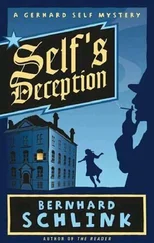
Bernhard Schlink
The Reader
Translated from the german by Carol Brown Janeway
W HEN I was fifteen, I got hepatitis. It started in the fall and lasted until spring. As the old year darkened and turned colder, I got weaker and weaker. Things didn’t start to improve until the new year. January was warm, and my mother moved my bed out onto the balcony. I saw sky, sun, clouds, and heard the voices of children playing in the courtyard. As dusk came one evening in February, there was the sound of a blackbird singing.
The first time I ventured outside, it was to go from Blumenstrasse, where we lived on the second floor of a massive turn-of-the-century building, to Bahnhofstrasse. That’s where I’d thrown up on the way home from school one day the previous October. I’d been feeling weak for days, in a way that was completely new to me. Every step was an effort. When I was faced with stairs either at home or at school, my legs would hardly carry me. I had no appetite. Even if I sat down at the table hungry, I soon felt queasy. I woke up every morning with a dry mouth and the sensation that my insides were in the wrong place and too heavy for my body. I was ashamed of being so weak. I was even more ashamed when I threw up. That was another thing that had never happened to me before. My mouth was suddenly full, I tried to swallow everything down again, and clenched my teeth with my hand in front of my mouth, but it all burst out of my mouth anyway straight through my fingers. I leaned against the wall of the building, looked down at the vomit around my feet, and retched something clear and sticky.
When rescue came, it was almost an assault. The woman seized my arm and pulled me through the dark entryway into the courtyard. Up above there were lines strung from window to window, loaded with laundry. Wood was stacked in the courtyard; in an open workshop a saw screamed and shavings flew. The woman turned on the tap, washed my hand first, and then cupped both of hers and threw water in my face. I dried myself with a handkerchief.
“Get that one!” There were two pails standing by the faucet; she grabbed one and filled it. I took the other one, filled it, and followed her through the entryway. She swung her arm, the water sluiced down across the walk and washed the vomit into the gutter. Then she took my pail and sent a second wave of water across the walk.
When she straightened up, she saw I was crying. “Hey, kid,” she said, startled, “hey, kid”-and took me in her arms. I wasn’t much taller than she was, I could feel her breasts against my chest. I smelled the sourness of my own breath and felt her fresh sweat as she held me, and didn’t know where to look. I stopped crying.
She asked me where I lived, put the pails down in the entryway, and took me home, walking beside me holding my schoolbag in one hand and my arm in the other. It’s no great distance from Bahnhofstrasse to Blumenstrasse. She walked quickly, and her decisiveness helped me to keep pace with her. She said goodbye in front of our building.
That same day my mother called in the doctor, who diagnosed hepatitis. At some point I told my mother about the woman. If it hadn’t been for that, I don’t think I would have gone to see her. But my mother simply assumed that as soon as I was better, I would use my pocket money to buy some flowers, go introduce myself, and say thank you, which was why at the end of February I found myself heading for Bahnhofstrasse.
T HE BUILDING on Bahnhofstrasse is no longer there. I don’t know when or why it was torn down. I was away from my hometown for many years. The new building, which must have been put up in the seventies or eighties, has five floors plus finished space under the roof, is devoid of balconies or arched windows, and its smooth façade is an expanse of pale plaster. A plethora of doorbells indicates a plethora of tiny apartments, with tenants moving in and out as casually as you would pick up and return a rented car. There’s a computer store on the ground floor where once there were a pharmacy, a supermarket, and a video store.
The old building was as tall, but with only four floors, a first floor of faceted sandstone blocks, and above it three floors of brickwork with sandstone arches, balconies, and window surrounds. Several steps led up to the first floor and the stairwell; they were wide at the bottom, narrower above, set between walls topped with iron banisters and curving outwards at street level. The front door was flanked by pillars, and from the corners of the architrave one lion looked up Bahnhofstrasse while another looked down. The entryway through which the woman had led me to the tap in the courtyard was a side entrance.
I had been aware of this building since I was a little boy. It dominated the whole row. I used to think that if it made itself any heavier and wider, the neighboring buildings would have to move aside and make room for it. Inside, I imagined a stairwell with plaster moldings, mirrors, and an oriental runner held down with highly polished brass rods. I assumed that grand people would live in such a grand building. But because the building had darkened with the passing of the years and the smoke of the trains, I imagined that the grand inhabitants would be just as somber, and somehow peculiar-deaf or dumb or hunchbacked or lame.
In later years I dreamed about the building again and again. The dreams were similar, variations on one dream and one theme. I’m walking through a strange town and I see the house. It’s one in a row of buildings in a district I don’t know. I go on, confused, because the house is familiar but its surroundings are not. Then I realize that I’ve seen the house before. I’m not picturing Bahnhofstrasse in my hometown, but another city, or another country. For example, in my dream I’m in Rome, see the house, and realize I’ve seen it already in Bern. This dream recognition comforts me; seeing the house again in different surroundings is no more surprising than encountering an old friend by chance in a strange place. I turn around, walk back to the house, and climb the steps. I want to go in. I turn the door handle.
If I see the house somewhere in the country, the dream is more long-drawn-out, or I remember its details better. I’m driving a car. I see the house on the right and keep going, confused at first only by the fact that such an obviously urban building is standing there in the middle of the countryside. Then I realize that this is not the first time I’ve seen it, and I’m doubly confused. When I remember where I’ve seen it before, I turn around and drive back. In the dream, the road is always empty, as I can turn around with my tires squealing and race back. I’m afraid I’ll be too late, and I drive faster. Then I see it. It is surrounded by fields, rape or wheat or vines in the Palatinate, lavender in Provence. The landscape is flat, or at most gently rolling. There are no trees. The day is cloudless, the sun is shining, the air shimmers and the road glitters in the heat. The fire walls make the building look unprepossessing and cut off. They could be the firewalls of any building. The house is no darker than it was on Bahnhofstrasse, but the windows are so dusty that you can’t see anything inside the rooms, not even the curtains; it looks blind.
I stop on the side of the road and walk over to the entrance. There’s nobody about, not a sound to be heard, not even a distant engine, a gust of wind, a bird. The world is dead. I go up the steps and turn the knob.
Читать дальше













